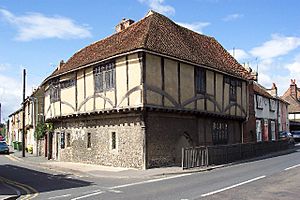Maison Dieu, Faversham facts for kids
Quick facts for kids Maison Dieu |
|
|---|---|

Maison Dieu in Ospringe, Kent.
|
|
| OS grid reference | TR0036260855 |
| Built | 1234 |
| Built for | Henry III |
| Governing body | English Heritage |
| Type | Grade II* |
| Designated | 29 July 1950 |
| Reference no. | 1069431 |
| Lua error in Module:Location_map at line 420: attempt to index field 'wikibase' (a nil value). | |
The Maison Dieu (a French name meaning 'House of God') is a historic timber-framed building in Ospringe, near Faversham in Kent, England. It was built in 1234 by order of King Henry III.
This special building has served many purposes over the centuries. It has been a hospital, a home for monks, a hostel for travellers, a retirement home, and even a place for kings to stay. It is located next to the old Roman road called Watling Street, which is now the busy A2 road.
The Maison Dieu was founded to help people. It was run by a master and three monks who belonged to the Order of the Holy Cross. They were joined by two other clerks who would hold church services. Their main job was to offer a safe place to stay for poor travellers and pilgrims walking along Watling Street.
The building even had a special room called Camera Regis, or the king's chamber. King Henry III and other royals used this room when they travelled through the area. The history of Maison Dieu also shows us how people with disabilities were part of society long ago. For example, records from 1235 show that a blind girl was welcomed into the hospital as a "servant of God and sister of the hospital."
History of the Maison Dieu
The Maison Dieu has a long and fascinating history. Here are some of the most important events that happened over the years.
| Date | What Happened |
|---|---|
| 1234 | King Henry III ordered the building of the Maison Dieu. |
| 1240 | The king allowed the Maison Dieu to hold a market and a fair in the nearby parish of Headcorn. This helped them raise money. |
| 1245 | The powerful St Augustine's Abbey in Canterbury gave the monks at Maison Dieu permission to bury people who died at the hospital. |
| 1314 | The master of the hospital, Nicholas de Staple, had an argument with the other monks and left. He returned 20 years later in 1334. |
| 1360 | King John II of France stayed at the Maison Dieu on his way back to France after being held captive in England. |
| 1511 | The Archbishop of Canterbury visited the hospital to check on how it was being run. |
| 1518 | The last monks at the hospital sadly died, possibly from the plague. After this, the hospital was no longer a religious house and its lands were given to St John's College, Cambridge. The building later became a pub. |
| 1573 | The building was rented by a man named Robert Transham. He used stones from the old hospital chapel to help rebuild the local parsonage (a house for a church leader). |
| 1925 | The Maison Dieu became one of England's first village museums. |
| 1950 | The building was officially recognized as a Grade II* listed building, meaning it is a very important historic site that must be protected. |
The Maison Dieu Today
Today, the Maison Dieu is cared for by English Heritage, a charity that looks after many of England's historic places. It is run by a local group called the Maison Dieu Museum Trust.
The building is used as a museum to show Roman artifacts found in the local area. Some of these items come from a nearby ruined church. The museum is a great place to learn about the history of Ospringe and the people who lived there long ago. It is usually open on weekends and holidays from spring to autumn.
Historic Pictures
The Faversham Society has a large collection of old photographs of the Maison Dieu. A picture from the 1890s shows the building in its original state. By 1900, the bottom floor had been turned into a shop. You can see more of these historic images in the Faversham Society's museum archive.
 | Roy Wilkins |
 | John Lewis |
 | Linda Carol Brown |



